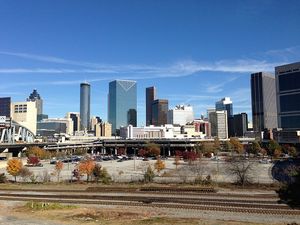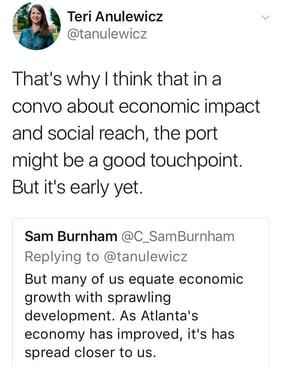|
By Sam Burnham @C_SamBurnham There is a lot of buzz being generated right now over the possibility of Amazon opening a secondary headquarters campus (HQ2) in the Atlanta area. There have been several rumored sites for the theoretical Atlanta location. There area several other cities in contention and each has its own strengths and weaknesses based on a list of Amazon's preferences in regard to infrastructure and quality of life. Many Georgians living outside the metro are casting a skeptical eye on this development and not because we think Atlanta can't pull this off. On the contrary, it's because we know Atlanta is the best choice on the list. When you look into the quality of life -museums, concerts, entertainment, sports, restaurants, bars, Atlanta is a magnet. Georgia's business friendly laws and regulations are specifically geared for this campaign. The presence of the Georgia Institute of Technology and the portion of Kennesaw State formerly Southern Polytechnic offers an Amazon River of entry level employees just minutes, perhaps only blocks, from the proposed locations. Atlanta's airport puts the employees of the new site within two hours of 75% of the US population and most major US business centers. This leaves only Atlanta's traffic and relatively meager transit system as a drawback for Amazon, who includes ease of commute and transportation in their list of preferences. With the City of Atlanta and Governor Deal both scrambling to do whatever it takes to get this deal done, the upcoming push for improved and expanded transit is all too predictable. Who Stands to Benefit "The Gulch" in Atlanta is One Possible Site For Amazon HQ2 "The Gulch" in Atlanta is One Possible Site For Amazon HQ2 As with all economic development in the Peach State, Atlanta stands to reap major benefits from this deal. While Cobb, Dekalb, and other metro counties could actually be the host of the site, the amenities of Atlanta are the draw and will be raking in the cash spent by an estimated 50,000 employees averaging $100,000 annually. If we do see the expanded transit it will take to seal this deal outright, Cobb, Dekalb, (wealthy northern) Fulton, Gwinnett, and perhaps Hall counties on the north end will see new transportation options to better connect them with the new jobs and the amenities we've mentioned. There would be similar benefits for Douglas, (growing) southern Fulton, Clayton, and Henry counties. These counties are where the incoming Amazons will live, work, and play. The annual influx of $5 billion in salaries alone would be a economic boom for the state. There is no denying the actual numbers of the deal. Add in the operational costs (theoretically spent locally) for maintaining such a campus would fund vendors and other businesses in the area well beyond the foreseeable future. This is a very big deal. The Unseen CostsGeorgia Changed forever on September 18, 1990. An announcement in Tokyo, Japan proclaimed Atlanta as the host of the 1996 Summer Olympic Games. Atlanta was a growing city and showed much economic promise. But the Olympics changed the game forever. In the years leading up to the games, Atlanta grew rapidly. The city was on the map. The whole world was talking about it. Businesses and people came in droves. They loved the climate, the economy, and everything else Atlanta was coming to offer. They stayed. And more came behind them. In 27 years Atlanta has gone from a big city by the standards of the South to a world class metropolis. It has been an amazing transformation to say the least. But what people living in the non-metro areas have learned in that time is that there is no wall around that metropolis to keep it in. While many other world class cities have grown up and up towards the clouds, Atlanta has grown up and out, spreading across the landscape like a patch of concrete kudzu, covering everything in its path. This is where the perceptions of the people of outlying Georgia come into play. This is where understanding the concerns of "fly-over" or even "drive-past" Georgia will make a difference if there must be a state-wide push to make this deal happen. Everyday, Atlantans sit in traffic possibly thinking that they are beginning or finishing a day of productive economic activity that benefits the economy of the state. What they don't know is that there are a multitude of people in the TV market area that are watching the traffic updates on channels 2, 5, 11, and 46 and laughing at the "fools" sitting in traffic. It is like the zoo where people observe captive species and wonder at their mannerisms and behavior. But mostly they just hope to never live in such a manner. Pile on the crime, lack of affordable housing, the small building lots, and lack of exposed earth, count us out. We don't want that. Not in our back yard. But that is what we see every single time the strip malls, overhead superhighways, and office parks pop up just a little closer to the house. And there is no Roundup for that sort of kudzu. There is no way to resist it as farm after forest falls under the bulldozer, never to be seen again. Ironically, the people in the bulldozers and those who follow, immediately begin to lecture us on the environment, climate change, emissions, recycling, "sustainability." It becomes the Once-ler giving the Lorax a good lesson on conservation. This is what folks outside Metro Atlanta hear when Atlantans tell us about the economic benefits of this deal. When Atlanta booms, it lands on us. And we don't necessarily want it. Reaching for Cooperation Metro Democrat & Rural Conservative Having Rational Discussion About Georgia Economic Development Metro Democrat & Rural Conservative Having Rational Discussion About Georgia Economic Development I don't want to finish this article without covering a Twitter conversation I had on Thursday with Teri Anulewicz on this very topic. Teri is a Democratic candidate for Georgia House District 42 as well as the former Smyrna Ward 3 representative and Mayor Pro Tem. She was reaching out to me in search of understanding after I had tweeted about my diminished enthusiasm for the Amazon HQ2 Atlanta plan. This was a honest search for understanding and the genuineness of the conversation was refreshing in these times. The transit improvements will require some regional, if not state-wide, cooperation. Atlanta cannot do this alone. But selling the plan to the outlying areas is going to be difficult. There would be some greater access to transit for many Georgians. But will the cost be worth the amount of times we plan to use the improvements? As long as we see Atlanta transit (again, perception) as a place to pay to get mugged on an inconvenient time schedule, we're going to drive our own cars and pay to park. If the parking disappears, we just won't go. It won't be worth it. If you want to sell transit improvements to us, show us how it makes our lives better directly or we will never agree to help pay for it. That is where the conversations like the one Teri and I had this past week become vital in our future. Metro folks need to listen to our concerns, understand that we don't always see their idea of economic growth as beneficial to us. We often see it as counterproductive and dangerous to our communities and our way of life. It also won't hurt us to listen as well. Perhaps in doing so we develop a better relationship between the "two Georgias" and can find benefits for both sides in the discussion. For example, in our discussion Teri and I agreed that the expansion of the Port of Savannah benefited the whole state. Projects like that can be cooperative and everyone can win a little. Both of our ideas of good economics are represented. If we can create new ways for Atlanta to thrive without paving the entire state, that can be a similar situation. I don't think we have to have it one way or the other. Honestly, I think Atlanta is too far gone for us to ever have it "our" way. I don't think our economy or environment can withstand having it only "their" way. So now we are faced with the reality of the metro and the rural partnering for a healthy coexistence. But that requires respect, trust, communication, and some willingness that I saw Thursday. And thank you, Teri, for being a part of that. Let us look to the future: trust but verify.
0 Comments
Leave a Reply. |
Sam B.Historian, self-proclaimed gentleman, agrarian-at-heart, & curator extraordinaire Social MediaCategories
All
Archives
November 2022
|




 RSS Feed
RSS Feed
